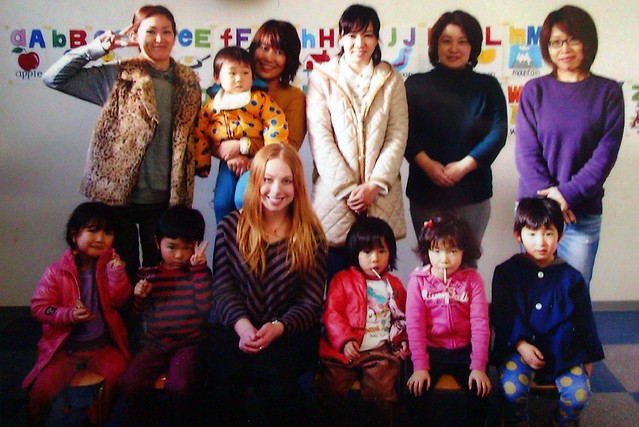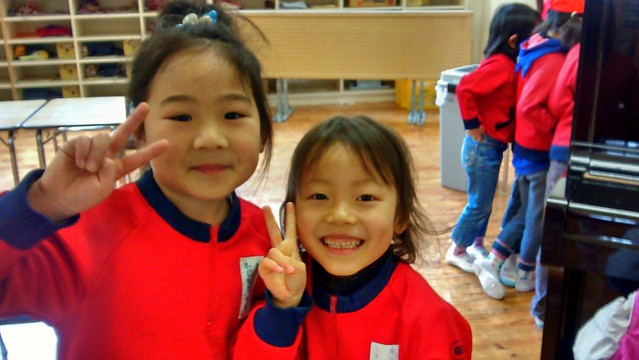I’m a huge advocate of teaching English abroad as a way to make traveling more affordable. You get a steady pay check, while at the same time having the opportunity to travel around a new country and the flexibility to save some of your earnings for even more travel once your contract is finished. Beyond the money, living in a different country is like traveling on a whole new level: You get to immerse yourself in the food, language and culture in a much deeper way than you could if you were just passing through on a trip.
When I’m preaching these virtues of teaching English abroad, many people are quick to tell me it won’t work for them because they don’t like kids. The thing is, I was never the “good with kids” girl either – the type of person who parented younger siblings or babysat their neighborhood’s children every weekend. That’s probably why, before I started teaching English, there were a lot of things I didn’t know about kids.
Unconditional Love

I’m not sure how I thought the students would react to me when I arrived at school for the first time, but I definitely didn’t expect instant adoration. Having taught in both Thailand and Japan, I can confidently say that kids under 10 years old (and sometimes older) will be completely enamored with you. I didn’t have to do anything at all to impress them. I just showed up, and they were fascinated with me. Students fought about who would have the privilege of sitting next to me at lunch; and kindergarten children presented me with carefully-drawn portraits decorated with all the English words they knew. You may think you don’t like kids, but I defy you to reiterate that as you’re face-to-face with a wide-eyed 5-year-old who seems to want nothing in the world but your attention. I don’t want to sugar-coat it and imply that there are never challenges when it comes to teaching kids, but I can say that I could count on shrieks of joy as I arrived at school, and it’s hard not to enjoy your job when everyday starts with hugs.
“Your” Kids Are Different

I remember what was like to look at a kid knocking items off shelves in a grocery store, or a mom struggling to calm her kids down on the subway, and thinking “Ugh – I don’t like kids”. But as any parent will probably confirm, there’s a big difference between kids and your kids. Kids are generic and often annoying, but yourkids are endearing and forgivable. On your first day of teaching, sure, you’re just looking at a mass of little faces that you can’t tell apart, but before you know it, you start to recognize each and every one of them. Kids are not a homogenous group that all behave the same way – they’re tiny, developing people. Regardless of how young they are, they have quirks, personalities and senses of humor, and everything changes once you start to recognize that. I’ve never been impressed by kids’ cute antics before, but I quickly found myself tacking drawings to the fridge, and blabbering about the hilarious thing that Taiki or Kaem did that day. Once you see each kid for the unique individual that they are, it’s so much easier to like them.
The Language Factor

At family gatherings, my sister always gravitated towards entertaining our younger relatives, while I stood there wringing my neck awkwardly and bursting out with child-impressing gems like, “So, you’ve got a truck there, huh?” Interacting with kids never felt natural to me at all. So when I came home for Christmas after teaching for two years, I kind of assumed I’d be able to capitalize on everything I’d learned about communicating with kids.
The surprising part was that, as much as I felt I’d grown as a teacher, I still completely failed at winning over my little cousins. It made me realize that there’s this huge difference between what it’s like to interact with kids in your home country, and what it’s like to interact with them when you don’t speak the same language. It’s a miniature version of what you experience when you’re communicating with anyone when there’s a language barrier: There’s so much beauty in those rare moments of clarity, when you’re able to understand each other. There’s something so poignant about a 6 year-year-old taking my hand and teaching me a word in her language, or even better, proudly repeating back English vocabulary that I know I taught her. My students watched the way I struggled to express myself to them in Thai or Japanese, and it made them want to try too – made them want to flip open dictionaries and try to share their thoughts and feelings in English, so that I could understand them.
You think you don’t like kids? I say you don’t know kids.
